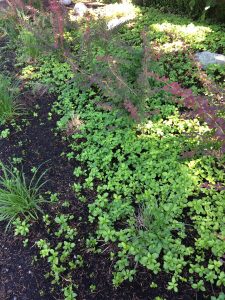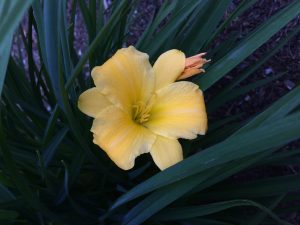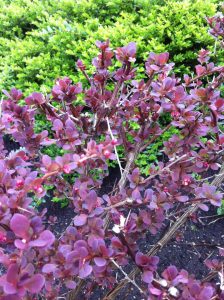Water plays a crucial part in life. Humans and plants both need it to survive. And as the Lower mainland in British Columbia stays hot we are reminded of the importance of water in the landscape. Which brings me to a site in Surrey.
Take a minute to examine the picture below.
What do you see? Left to right, Hemerocallis, Pachysandra terminalis groundcover, grasses and Berberis thunbergii. That covers the plant species. Now, let’s back-up to last season.
2016
This high-profile bed next to a busy sidewalk was completely bare except for some struggling islands of Pachysandra terminalis, a slow-growing groundcover that flowers. Towering above are beautiful native Douglas firs (Pseudotsuga menziesii).
The strata council wasn’t very happy with this arrangement so they asked for a quote to put some plants in. And so we did. Closest to the sidewalk we put Hemerocallis ‘Stella d’Oro’, a much used perennial which flowered beautifully.
Then came grasses and Japanese barberry (Berberis thunbergii). Both species are tough once they establish. The purple Berberis foliage is attractive.
Once we finished the install, we had to water the new plants and irrigation was checked and improved to protect them.
Comeback
Now back to the first picture above. Remember, we didn’t plant any Pachysandra terminalis in this bed. As irrigation came on, this groundcover came back. And furiously, considering that it’s a slow-growing plant. It’s now spreading throughout the bed as if it was reclaiming its bed from the new plants.
As it turns out, the groundcover simply didn’t have enough water. If the irrigation had been working properly all along, the new install wouldn’t have happened. I’m glad it did because it was a billable extra project; and it was fun because I worked alongside my boss.
If your plants struggle in the landscape check on them. Perhaps they just need extra care.







